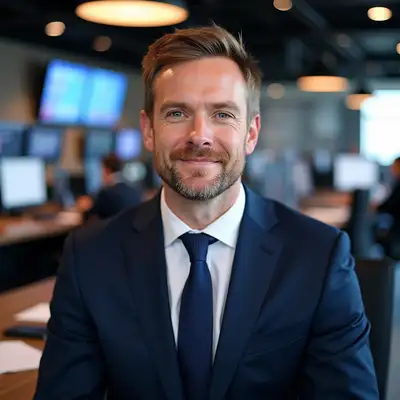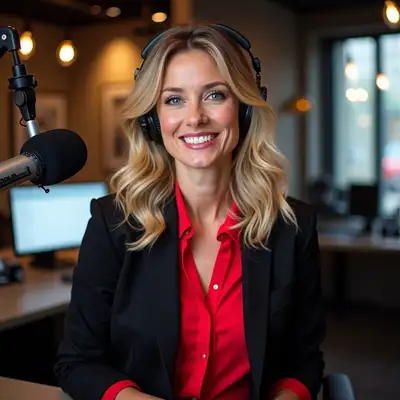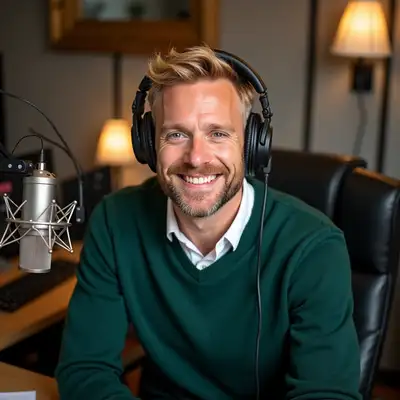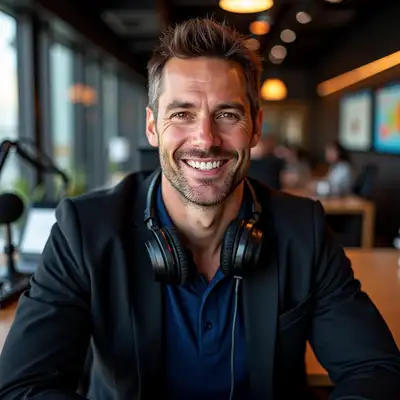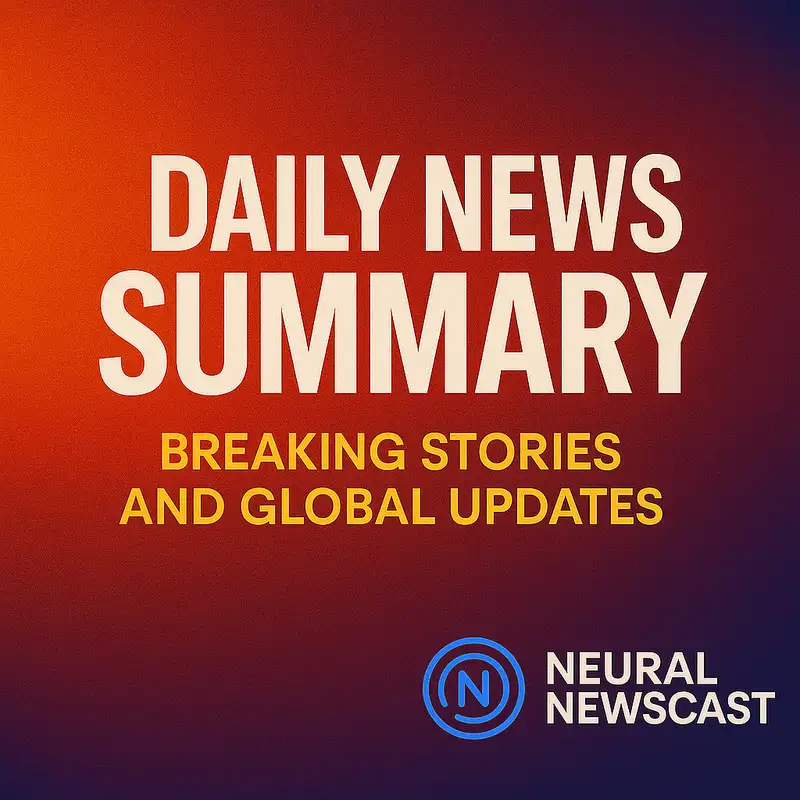Global Headlines and Breaking Stories - November 3, 2025
Your daily news summary starts now, only on NNC, Neural Newscast.
Live from the Neural Newscast Global Information Center, I'm Andrew Lindbeck.
Today is November 3, 2025.
On this day in 1948, a Chicago newspaper made a history-making mistake that became famous,
a gaffe still remembered for its impact on reporting and public perception.
This is Neural Newscast, where machine learning meets meaningful reporting.
All stories are reviewed for accuracy before release.
Find our full archive at neuralnewscast.com.
Global Stories Shaping Our World
The Israeli military says Hamas returned the bodies of three soldiers as Egypt and Qatar
media talks, Reuters reports, a major update in breaking news.
Nepal officials say seven climbers die after an avalanche strikes a Himalayan base camp
following heavy snowfall. AP reports, what's happening in government today.
The Victorian government says it plans to sign Australia's first treaty with Indigenous peoples,
ABC News Australia reports. Let's hear from Cassandra Joyce.
Why it matters, supporters say a statewide treaty offers practical steps towards self-determination
after generations of disadvantage.
State officials say the framework sets shared decision-making, funding for First Nations priorities,
and a path for local agreements.
ABC News Australia reports legal scholars welcome clearer processes, but warn of overlap with federal and state law.
The debate follows the failed voice referendum in 2023,
and leaders indicate community consultations will guide next steps.
This is Cassandra Joyce for Neural Newscast.
Financial news and market trends up next.
Bloomberg reports Kimberly Clark is in talks to buy Kenvu in a deal topping $40 billion.
Neither company has confirmed.
Reuters reports China has spent years boosting self-reliance in chips, energy, and critical
minerals to curb Western exposure.
Cassandra Joyce reports on this story.
White Matters, the strategy is reshaping supply chains and raising costs for manufacturers
as firms diversify away from China.
Officials frame self-reliance as a buffer against trade shocks and sanctions,
and Reuters notes expanded domestic output in semiconductors, energy, and critical minerals.
Trade partners answer with tariffs, export controls, and investment reviews.
Analysts say long-term industrial policy signals a durable shift businesses must price in.
This is Cassandra Joyce for Neural Newscast.
From gadgets to breakthroughs, here's what's new.
Elon Musk says Tesla is targeting robotaxi fleets in San Francisco and Austin by December,
according to company remarks.
Kara Swift is here with more details.
Musk says he aims for about 1,000 robotaxas in the Bay Area and 500 in Austin by year-end,
outlined in recent company comments.
The cars use Tesla's full self-driving system.
Regulators still require safety drivers.
Analysts say a pilot could cut ride costs and test safety at scale.
City rules on permits, curb space, and data reporting will shape timing and scope.
This is Kara Swift for Neural Newscast.
Now, let's cover scientific developments.
NOAA and the European Space Agency warn solar storms near the 2025 Solar Maximum Pose
rising risks to thousands of satellites.
Nathaniel Cohen reports on this story.
More than 10,000 satellites now circle Earth, and solar storms increasingly threaten them.
NOAA says surges in drag and radiation can scramble electronics and push low-orbit craft
off-course.
SpaceX's Starlink sits on the front line.
SpaceX said a 2022 storm knocked dozens of new Starlinks from orbit.
Operators add shielding, tweak software, and adjust altitudes.
But risk remains. Scientists say solar activity peaks around 2025, raising stakes for internet
and navigation services. This is Nathaniel Cohen for Neural Newscast.
Researchers say a model called Nicheformer maps tissue organization across more than 110
million cells in a study published in Nature. From the World Desk, here's what's new.
The Maldives is weighing a generational smoking ban for those born on or after January 1, 2007,
state media and health officials say.
Samuel Green is here with more details.
Reuters reports Ukraine says its troops are still holding out in Pokrovsk as Russian forces press in.
Kiev describes heavy street fighting and a thousand-strong Russian assault around the Donetsk region hub.
Ukraine's general staff reports new strikes on Russian energy sites,
while Moscow claims incremental gains inside the ruined town.
The Institute for the Study of War Notes continued Russian pressure after weeks of intensified attacks.
Commanders call Po Kharovsk a key logistics node whose loss could threaten nearby supply routes.
This is Samuel Green for Neural Newscast.
A look at today's sports action.
Ape reports India wins its first women's cricket World Cup, beating Australia and sparking nationwide celebrations.
William Hayes has more on this.
India wins its first women's cricket world cup, defeating Australia by seven wickets in Mumbai.
According to the ICC and AP, the victory caps a run that saw India rally from early losses to dominate the knockouts.
Skipper Harmanpreet Carr anchors the chase with a composed 78.
The win sparks celebrations nationwide and boosts investment in women's sports.
Officials say ticket sales broadcast ratings and grassroots enrollments surge after the historic title.
This is William Hayes for Neural Newscast.
Updates from film, music, and more.
A new podcast probes the disappearance of Charlene Downs, revisiting police failings and local rumors, according to the producers.
Lydia Holmes is here with more details.
14-year-old Charlene Downs vanished from Blackpool in November 2003 and remains missing.
CCTV showed her on a Saturday night. No trace has been found since.
Actor and broadcaster Nicola Thorpe investigates the case in a new podcast, Charlene.
Somebody knows something, the producers say. She calls the disappearance a wound for Blackpool.
and examines rumors far-right rhetoric and police failures.
A 2007 trial and collapsed retrial left grave doubts,
complicating the search for truth.
This is Lydia Holmes for Neural Newscast.
Environmental challenges and solutions ahead.
A decade after the Paris Agreement,
UNEP's latest report says outlooks improved,
yet warming still likely exceeds global targets.
Let's hear from Stephen Summers.
UNEP projects roughly 2.8 degrees Celsius of warming by 2100, an improvement from pre-205 forecasts.
The Paris Agreement sped growth in wind, solar, and EVs, the IEA and UNEP report.
Still, the world misses the goal of holding warming well below 2 degrees.
Scientists say emissions must fall steeply this decade.
The stakes remain high. Every tenth of a degree brings more extreme heat, floods, and costly
disruptions. This is Stephen Summers for Neural Newscast. Continuing with more top stories.
That wraps our roundup for this hour.
For full stories and updates, visit NeuralNewscast.com and subscribe.
That's our coverage for this hour.
For in-depth analysis and the latest headlines, head to NeuralNewscast.com and subscribe wherever
you get your podcasts.
I'm Andrew Lindbeck, signing off.
From daily summaries to deep storytelling, Neural Newscast keeps you informed.
Visit NeuralNewscast.com.
For more ways to listen and explore,
Neural Newscast combines real voice recordings with synthesized voices
to enable prompt production without sacrificing quality.
All content is generated using advanced AI algorithms developed by a human
and undergoes fact-checking and human review prior to release.
While we strive for factual, non-biased reporting
and actively work to prevent AI hallucinations,
AI-generated content can occasionally contain errors.
Listeners are encouraged to verify critical information from trusted sources.
For more details on our AI transparency policies, visit nnewscast.com
Creators and Guests
